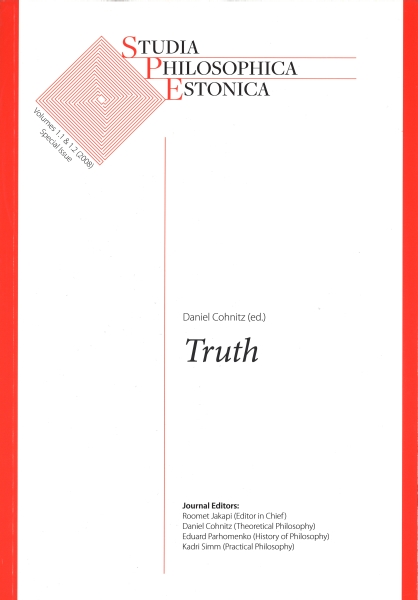'Indeed,''Really,''In Fact,''Actually'
DOI:
https://doi.org/10.12697/spe.2008.1.1.03Keywords:
deflationary theories of truth, truth, deflationismAbstract
Interjections, such as those in the title, together with a few similar devices, when qualifying clauses expressing truth-conditions, or that such conditions have been satisfied, are entitled 'force-amplifiers'. Disputes between deflationary and inflationary truth-theories sometimes are assumed to turn on the supposed pivotal role that these devices are construed as playing in the interpretation of the clauses they qualify. I argue that they are not dispensable add-ons. Moreover, even in their absence the relevant clauses giving truth-conditions permit interpretations that are not deflationary-friendly. I maintain that this is a significant fact about the use to which writers put them. I then defend, a thesis about force-amplifiers that makes them indispensable to the interpretation of the relevant clauses, and that renders certain moves unavailable to popular deflationist treatments.
Downloads
References
Alston, W. P. (1996). A Realist Conception of Truth, Cornell University Press.
Austin, J. L. (1961). Truth, in G. J. W. J. O. Urmson (ed.), Philosophical Papers, Oxford University Press.
Ayer, A. J. (1946). Language, Truth and Logic, second edn, Dover Books.
Blackburn, S. and Simmons, K. (eds) (1999). Truth, Oxford University Press.
Dummett, M. (1981). Frege, Philosophy of Language, second edn, Duckworth.
Dummett, M. (1993). Existence, The Seas of Language, Oxford University Press, chapter Existence, pp. 277-307.
Evans, G. (1982). The Varieties of Reference, Oxford University Press.
Frege, G. (1967). The Basic Laws of Arithmetic, University of California Press.
Frege, G. (1999). The thought: a logical inquiry, in S. Blackburnand K. Simmons (eds), Truth, Oxford University Press.
Hare, R. M. (1952). The Language of Morals, Oxford University Press.
Hill, C. (2002). Thought and World, Cambridge University Press.
Künne, W. (2003). Conceptions of Truth, Oxford University Press.
Kotarbinski, T. (1966). Gnsoiology: the Scientific Approach to the Theory of Knowledge, Pergmon Press.
Larson, R. and Segal, G. (1995). Knowledge of Meaning: An Introduction to Semantic Theory, MIT Press.
Lewis, D. (2001). Truthmaking and difference-making, Nous 35: 602-615.
McGinn, C. (2000). Logical Properties, Oxford University Press.
Moore, G. E. (1962). Some Main Problems of Philosophy, Collier Books.
Plato (1961). Sophist, in E. Hamilton and H. Cairns (eds), The Collected Dialogues of Plato, Pantheon Books.
Quine, W. V. O. (1970). Philosophy of Logic, Prentice Hall.
Ramsey, F. P. (1991). On Truth: Original Manuscript Materials (1927-1929), Kluwer Academic Publishers.
Russell, B. (1999). William james conception of truth, in S. Blackburn and K. Simmons (eds), Truth, Oxford University Press.
Sainsbury, M. (1999). Names, fictional names, and “really”, Proceedings of the Aristotelian Society suppl. 73: 243-269.
Searle, J. R. (1969). Speech Acts, Cambridge University Press.
Searle, J. R. (1995). The Construction of Social Reality, Free Press.
Soames, S. (1999). Understanding Truth, Oxford University Press.
Tarski, A. (1949). The semantic conception of truth and the foundations of semantics, in H. Feigl and W. Sellars (eds), Readings in Philosophical Analysis, Appleton-Century-Crofts, Inc.
Tarski, A. (1983a). The concept of truth in formalized languages, Logic Semantics and Metamathematics, Oxford University Press, pp. 152-278.
Tarski, A. (1983b). The establishment of scientific semantics, Logic Semantics and Metamathematics, Oxford University Press.
Tarski, A. (1983c). Logic Semantics and Metamathematics, 2nd edn, Oxford University Press.
Van Cleve, J. (1996). Minimalist truth is realist truth, Philosophy and Phenomenological Research 56: 289-304.
Vision, G. (2004). Veritas: the correspondence theory and its critics, MIT Press.
Whitehead, A.N. and Russell, B. (1962). Principia Mathematica to *5 Cambidge University Press.
Wiggins, D. (1999). Names, fictional names, and “really”, Proceedings of the Aristotelian Society suppl. 73: 270-286.
Williams, C. J. F. (1992). Being, Identity, and Truth, Oxford University Press.

